Allison M. Dickson's Blog, page 25
August 1, 2011
3 Reasons Why Novelists Should Blog: A Rebuttal
 This morning, Galleycat posted an article from blogger/writer Livia Blackburn entitled 3 Reasons Why Novelists Shouldn't Blog. While I contributed a comment, I thought the more natural thing would be to (waste considerable time not writing a novel) come over to my corner of the blogosphere and elaborate further.
This morning, Galleycat posted an article from blogger/writer Livia Blackburn entitled 3 Reasons Why Novelists Shouldn't Blog. While I contributed a comment, I thought the more natural thing would be to (waste considerable time not writing a novel) come over to my corner of the blogosphere and elaborate further.First, I want to say that Blackburn makes some cogent points about the pitfalls many novelists fall into while blogging. Namely that they spend way too much damn time talking about writing. I've written a number of blog posts about writing. It's a natural tendency for many career writers, because it's our trade, and we want to write what we know. But ultimately, that's only going to net you a few readers. And VERY few buyers. I know this from personal experience, just looking at Google Analytics. My most popular posts are not about the craft. Well, not exactly. The most popular post on my blog is a review I wrote for a portable word processor, the Alphasmart NEO. So it's about writing equipment, not necessarily about writing itself.
But the next most popular blog post on this site was an open letter I wrote to the First Lady, Michelle Obama, about her plan of attack against obese kids. In fact, I'd say that even though it hasn't had quite as many hits as the NEO post, it's more popular because of its rate of growth. The former has had two years to build up steam. I wrote to Mrs. Obama back in March, and it's had nearly as many hits. The third most popular blog post was about my attempt to make Peruvian-style rotisserie chicken. Go figure.
 So there you have it. Three top blog posts from a relatively active blog, two of which have nothing at all to do with writing. What does this tell me? If I want to have readers, I'm better off not spending all my time talking about my work. It bores most people, and writers are a very small niche. And with the variety of blogs out there already devoted specifically to the craft, my stuff becomes invisible. That, and well, if you spend too much time tooting your own horn, you look like a self-absorbed douchecanoe.
So there you have it. Three top blog posts from a relatively active blog, two of which have nothing at all to do with writing. What does this tell me? If I want to have readers, I'm better off not spending all my time talking about my work. It bores most people, and writers are a very small niche. And with the variety of blogs out there already devoted specifically to the craft, my stuff becomes invisible. That, and well, if you spend too much time tooting your own horn, you look like a self-absorbed douchecanoe.So why blog?
1. I don't know about the rest of you, but I've been putting my thoughts to the web since 2005. After that long, it's become a reflex. While my sites have undergone some major changes and rebirths since then, I'm still here, and I'm not going anywhere. I get a respectable number of hits a day, even if I don't get a lot of commenters, but that's okay. I'm a pretty prolific thinker, and I have a lot of interests that I like to discuss openly, such as movies and politics and cooking and parenting and random general stuff. I recently took up a swimming hobby, so I've been talking about that too. Writing is not all I'm about. If it were, I'd be pretty goddamn boring. This site has my name on it. It's meant to encompass all of me, not just my authoring career. If this sounds like you, keep blogging.
2. Some days, writing anything at all is a victory. I disagree that time spent blogging is time spent away from working on my latest and greatest book or story. If I'm ready and willing to delve into my make-believe, I damn well do, and very little will stop me. If I'm gonna procrastinate, I'm gonna procrastinate. For me, time spent blogging is usually time spent away from watching TV or doing housework or napping. I'm not going to talk to you like you're misdirected little children. You know yourself better than anybody else. If you truly would rather be working on your book than anything else, you will. Trust me. In the meantime, don't feel guilty about blogging or doing anything else not related to your writing project. Guilt is not conducive to higher productivity.
3. I've said this before in other articles, and I'll say it again. In this brave new world of publishing where we must market our own work, people make the mistake of only marketing the work. They forget about themselves. If I think you're a total bore, I probably won't buy your book. The best way for me to know you're not a total bore, at least if you're not already my friend on Facebook or Twitter? Your blog. People talk so much about platform, platform, platform. Well, in my opinion, when you're trying to sell your own fiction, a huge plank in that platform is you. Use your blog to tell us who you are and what you're about. Your own life is a story. You might think it's boring, but trust me, the most successful websites are often about people who are doing nothing more than being themselves. The same goes for salespeople.
If your blog isn't accomplishing those three things, then it might not be the most successful venture for you. That doesn't mean you shouldn't keep doing it. Just don't expect to get a whole lot in return other than your personal enjoyment. In the meantime, I will hold on to blogging as a viable way to not only interact with a potential audience, but also one of the many ways to have FUN in life. I've found that to be one of the most essential ingredients for writing the other stuff.
Published on August 01, 2011 06:07
July 29, 2011
Review: Cowboys & Aliens
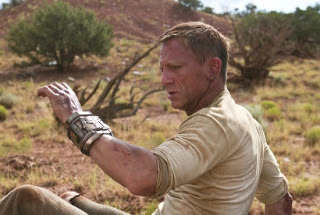
I wonder if this thing could write me into a better movie...
I love a gritty Western. I also love a great alien movie. Putting them together just seems like a very natural fusion, like the salted caramel of fiction. So when I first saw the trailer for Cowboys & Aliens sometime ago, I about wet myself. And that was even before I saw that Daniel Craig was in it. I also figured that since it was in the hands of the guy who made Iron Man, we were golden.
Boy, was I just setting myself up for a broken heart.
Let's first talk about how the movie begins, because that was the good part, with a dirty Jake Lonergan (Daniel Craig) sitting up in a desert with no idea where or who he is. He also has this weird bracelet on his arm, whose purpose is pretty evident on any number of the movie's posters. (NON-SPOILER ALERT: It shoots holes into aliens n'shit). He quickly disarms some bounty hunters in that standard Bond-like badass fashion that we can expect from Daniel Craig. This seems promising.
Flash forward to the failing gold mining town of Absolution, full of all the requisite archetypes (wise country preacher, gruff town sheriff, affable barkeep, powerful rancher with a spoiled idiot son). Turns out Lonergan is a wanted man, and even though he can't remember his crimes as a stage coach robber, he's about to get hauled off to prison anyway. That is until alien drone ships start dropping bombs all over the place and kidnapping people by wrapping cables around them and zipping them off through the air to wherever. It's at this point that Lonergan finds out what all that wrist bracelet of his can really do, and he accompanies the remaining survivors on a "harrowing adventure" (notice my ironic quotation marks) to get their townfolk back. Immediately after that, the story starts slamming on the brakes and veering out of control, and it never quite finds its way again.
In fact, the entire movie reads like one two-hour-long anticlimax. And there is absolutely no reason in the world, with this formula and with these actors, that this should be so. But it is. Trust me, it is.
There's nothing quite so disappointing as seeing good onscreen talent going to waste on a terrible script. This is especially so with Harrison Ford, who first begins as a brutal tyrant and at some point becomes the honorable old man hero without any of the character development that makes such a journey believable. The same could almost be said of Daniel Craig, whose character is so under-developed, joyless, and monotone I had trouble caring about him. A better script would have more skillfully fine-tuned the whole "brutal silent type with a heart of gold" thing (see: Daniel Craig in Casino Royale). Instead, I was just forced to admire how mighty fine he looks in a cowboy hat and a pair of chaps. Not that there is anything inherently wrong with that, but a man of Craig's talents deserves better material.
And maybe that's the problem with Cowboys & Aliens. It wastes every opportunity it has to thrill and engage its audience, and instead combines too many things and underbakes them all. As a regular Western, it might have been damn good. It would have been allowed to breathe and really explore the relationship between the lead characters. Maybe if they'd been blowing up something other than aliens, I would have been able to enjoy all its good Westerny elements instead of wondering why the stupid aliens look like the love children of cave trolls from Lord of the Rings and the Alien Queen from Ripley's universe.
I later learned this film had something like eight writers, and it took a decade to get the concept off the ground. These are never great signs. But it's also a damn shame that Jon Favreau couldn't have overseen it with all the skill he showed on Iron Man, though it was clear in Iron Man 2 that his tendency to love himself too much could get the best of his judgment. I have a message for ya, Jon. You might wanna get control of your ego a bit. A couple more movies like this, and people will start mentioning you in the same breath as M. Night Shyamalan when they lament directors who had so much promise before they were swallowed whole by their own bullshit.
Grade: C
Published on July 29, 2011 20:57
July 20, 2011
Their Version of Success; My Version of Success
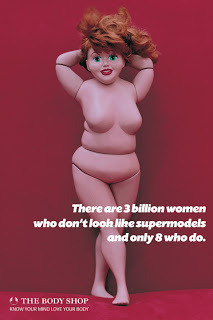 When I first started swimming, I never thought that in a month, I'd swim a mile. And that I'd be able to do it in roughly the same amount of time it initially took me to swim a half mile. Ever since I've been doing this, I feel, for lack of a more elaborate word, happy. I have my old glide back. My body feels like a well-fitting glove. And even on the days when I'm positive I've sapped the last of my energy, I find I have something left to give.
When I first started swimming, I never thought that in a month, I'd swim a mile. And that I'd be able to do it in roughly the same amount of time it initially took me to swim a half mile. Ever since I've been doing this, I feel, for lack of a more elaborate word, happy. I have my old glide back. My body feels like a well-fitting glove. And even on the days when I'm positive I've sapped the last of my energy, I find I have something left to give.Still, people will continue to measure my success with their own benchmarks, the most common of which is weight. It's the question I hear most often. "Wow! You're doing great! So how much weight have you lost??"
I tell them I don't know. I tell them I don't care. I tell them I'm certainly not dieting, and that I deprive myself of very little. That while I'm burning massive amounts of calories, I'm also replacing a good number of them as well. If I didn't do that, I certainly wouldn't be sustaining this rigorous exercise routine. And I certainly wouldn't have the enthusiasm for it that I do. There's nothing exciting or fulfilling about controlled starvation. And there's certainly nothing sustainable about it. I've learned that over many years of dieting, so I just don't do it anymore. I killed a promising kickboxing hobby that way--by overwhelming myself with a strict eating plan in addition to a hardcore fitness regimen, and when I failed at one thing (the diet), I quit the other. I'm certainly not going to start that shit with swimming.
What has been fulfilling about this experience is that I've been giving my body the attention and nourishment it deserves, by keeping it active and feeding it well. This has been an entirely positive experience for me. So positive, in fact, that I couldn't imagine quitting. I dream of the water. I sigh when I enter it. By focusing on health rather than merely weight, I've found the way to do something for the love of it. Oh sure, there have been some days when I'm just not all that into it, but every swim ends the same way: with gratitude.
But people are still curious what sort of changes my body is undergoing. And though I haven't made that the centerpiece of my fitness efforts, I can't help but take a little satisfaction over some of the differences in my appearance over the last couple months. I've lost at least eight inches off my waist and hips/ass. My arms are thinning out, with muscles becoming a bit more prominent, especially in the shoulder area. My thighs don't rub together as much as they were. My spare tire in the upper abdominal area is visibly shrinking. My brand new bathing suit is getting baggier by the day. I'll probably need another one by my birthday in October. My knees no longer hurt. I'm noticing one of my chins is shrinking.
 So yes, my body is transforming as it adapts to the new physical routine. It's doing what it's supposed to be doing, and I'm just letting it happen. It's liberating not to think about it in terms of inches or pounds or pants sizes or whatever. I'm just relishing the endorphin rush. The certainty that when I step into that pool, I'm motherfucking Wonder Woman, and when I step out of it, I'm motherfucking Wonder Woman after an epic brawl with an aqua monster.
So yes, my body is transforming as it adapts to the new physical routine. It's doing what it's supposed to be doing, and I'm just letting it happen. It's liberating not to think about it in terms of inches or pounds or pants sizes or whatever. I'm just relishing the endorphin rush. The certainty that when I step into that pool, I'm motherfucking Wonder Woman, and when I step out of it, I'm motherfucking Wonder Woman after an epic brawl with an aqua monster.As for my total weight loss after six weeks or so of regular lap swimming? 5 pounds. That's it. 5 pounds. If I were merely dieting (without the rigorous exercise), I'd have lost twice as much weight by now, and for some reason, I'd have a perverse feeling of accomplishment at that. "Yay, I successfully deprived my body of calories! Sure, I'm hungry all the time and I have to constantly deny myself food because I'd go over my Points or run out of Jenny Craig food or that scary woman from Biggest Loser will crush my windpipe. And I'm pretty sure that, like a rubber band that's been stretched far enough, I'll eventually snap back and do what my body was programmed to do: eat and store calories. And I'm sure I'd be twenty pounds heavier in six months and then gain even more weight because of the sense of defeat and inertia that a failed diet always instills in me. But yay me! Pass the celery and grapefruits!"
So no, I don't care about the pounds. I don't count calories. I use common sense. Most of the time. The scale is tucked away under my bathroom counter behind the toilet paper and cleaners. I only pulled it out that once, before sitting down to write this blog. It told its story, and I quietly put it away, my emotions neutral. That piece of tempered glass no longer has the power to make or break my day. Why should it, when my eyes, my clothes, my rock-hard delts, and my overall well-being tell me that I'm just fine, thankyouverymuch?
If I could go through the rest of my life feeling this way and never lose another pound, I'd be happy. I don't have time for that kind of self-torture anymore. What's the point, when I already know with this saggy, fat and flabby body of mine, I'm capable of remarkable things? There are more milestones I look forward to crushing, and crush them I will. And I'll happily jiggle while I'm doing it.
Published on July 20, 2011 13:28
July 19, 2011
E-Publishing FAQ

I get a lot of questions about e-publishing from readers and writers alike, so I thought I would compile some of the most common ones into a handy dandy blog post. Keep in mind that I'm not an expert on this topic. All of my answers come from my own personal experience. My hope is that anyone reading this will either feel compelled to e-publish their own work or maybe download a few ebooks to read. No, you don't necessarily need a Kindle or similar dedicated device to read an ebook, but we'll get to that.
1. What made you decide to try e-publishing? Isn't self-publishing for people who couldn't hack it in the real publishing world, i.e. people who suck?
There are two answers to that last question: Yes and No. It's like one of those logic puzzles. Most sucky writers are forced to self-publish, but not all self-published writers are sucky. More and more writers from the traditional market are turning to e-publishing so they can have more creative control over their work and higher royalty payments. Others do it because their work has made the rounds, and though they were assured by many agents and publishers that their work was solid, the book deal just never happened.
I decided on e-publishing for a couple reasons. One, it's a very fast-growing market, and I wanted to be part of it. Two, I have a number of short stories, and I feel self-publishing is increasingly the way to go with them due to the ever-shrinking short story marketplace. I currently have my novel Scarlet Letters up on all the major ebook retailers. I never could quite get an agent to bite on it, but I didn't want it gathering dust either. And thankfully I made the decision to e-publish it, because it's doing quite well. This has spurred me to consider other novel projects for self-publishing.
Ultimately, I think people choose self-publishing because they want people to read their work. And who better to decide on whether a book is worth buying than people who read?
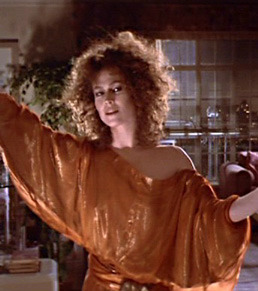
Maybe not this kind of gatekeeper, but close...
2. Aren't you worried about the lack of gatekeepers in the e-publishing world, and legions of terrible writers contaminating the talent pool with their terrible terrible stories?
I used to be, yes. But honestly, I can't allow myself to become too fixated on that anymore. I only need to worry about how good my own work is, and how I can get it in front of as many eyes as possible and just trust that the Darwinian system that has guided all living things through the millennia will also work here. There are gatekeepers in self-publishing. They're called readers. And the readers will naturally gravitate toward the better work, and they will come to expect a certain standard. They want stories that are coherent and properly edited. They want authors who can competently tell a story. They want the same experience they get from any book they pluck from a Barnes & Noble or library shelf. Writers who fail to live up to those standards will gradually fall away.
3. How much does it cost to e-publish your work?
First and foremost, the act of uploading a book onto Smashwords, Kindle Direct, or Barnes & Noble's PubIt is completely and totally free. If you have a story sitting in your files right now, you could click on either of those sites and get it uploaded in minutes and on the market place almost immediately (in the case of Kindle and BN, it can take a couple days to clear the vetting process). However, you don't necessarily want to go about it that way.
If you don't have extensive editing experience, it's recommended that you have your manuscript professionally edited or proofread. Your book will look and sell better if you do. If you don't know someone who can do this for you free of charge, consider an affordable freelancer. Aside from editing, there is the matter of proper formatting and a good cover. If you're handy with a photo manipulation program, you can crank out a cover pretty easily, following the dimension guidelines set by the publisher. You can search the Creative Commons site for images you can use. With the exception of the cover for Scarlet Letters (designed by the awesome Jeff Fielder) I did all of my covers myself using GIMP, a free open source photo manipulation software. As for formatting, each publisher has its own formatting and style guide that can make the process easier. I personally prefer the one at Smashwords, as it's more in-depth and works for all publishers. Once you learn proper formatting, the process of getting your manuscript ready for upload only takes a few minutes.
After you take all of these things into account, e-publishing is actually not all that difficult or expensive. But you have to put some work into it if you expect results.
4. Which publisher is the best? Kindle, Smashwords, etc?
Why not all of them? The key is getting your work into as many markets as possible. The beauty of Smashwords is that they will crank out your book into every file format. They will also distribute your work to places like Sony, Apple, Diesel, and Barnes & Noble. You can even get free or cheap ISBN numbers through them. However, distribution to these other stores through Smashwords can take a couple weeks, and they can also be slow on reporting sales through these other markets. So I like to upload to Smashwords and then Barnes & Noble and Amazon manually. That way, I'm in the top markets faster (where the big sales happen), and I can track those sales in real time.
Smashwords is also handy because they give you nice author pages, and they allow you to participate in more promotions and generate coupons. You can even make your work free if you want to (the other sites set a minimum price of $.99). They also have better sales analytics so you can track your downloads better. Smashwords is an essential tool in any e-publisher's toolbox.

These royalties were made possible by Amazon
5. What sorts of royalties do you get, and how often do you get paid?
Things can vary slightly among publishers, but for the most part you get a 70% royalty on things priced $2.99 and higher, and 40% on things priced below that. Things change in foreign markets (Amazon UK and Deutsch all have different royalty rates because they have things like VATs and currency conversion rates to worry about, same with Canada), but it isn't a huge deal.
Royalties are generally paid out quarterly from the publishers. However, there are delays in paid sales from vendors Smashwords distributes to. So you might not get your money from the Apple store, for instance, at the same time you get paid by Smashwords for your direct Smashwords sales. It might take another month for those stores to pay Smashwords, which means those payments will be in the next quarter's deposits.
6. I wish I could buy your books, but I don't have a Kindle/Nook/iPad. Now what?
Contrary to what you might think, you don't need either of these devices to enjoy an e-book. Yes, I know, it's certainly the more desirable way to do it. I have a Nook, and I adore the thing. However, if the purchase of such a device is out of your reach at the moment, you can download the Kindle and Nook reader apps for your computer free of charge. Also, if you happen to have an Apple or Android device (tablet or phone), you can also download the apps for that, and share your library between devices. I happen to love the Nook app for my Android phone, and often if I'm without my Nook device, you can catch me reading on my phone. I never thought that would be something I'd enjoy, but my phone's display is nice and big, and it's actually a comfortable experience for me.
If you purchase downloads from Smashwords, you can get them in HTML, Java, and PDF formats, all of which make it easy for you to read on your computer. So there are ways to enjoy ebooks that don't require the purchase of a dedicated device.
7. How do I decide what price to set my e-book at?
I discussed this to some degree in my last blog about why I'm currently giving my work away. But to sum it up, I believe that digital content should be priced in such a way that is compatible with current attitudes. People in general don't like paying for downloads at all if they can help it. I find $2.99 to be a fair price for a novel. Short stories, I'd price $.99, if I priced them at all. Keep in mind that when you're starting out of the gate, it's not going to be easy to get people other than your closest friends and family to invest in your burgeoning writing career. And if you are a writer, chances are, you're broke off your ass anyway and can't afford some kind of spendy marketing plan. And even if you could, chances are, you won't get a return on your investment anyway. Your writing is your best advertising, and the best way to entice people to read it is to make it as cheap as possible.
People might try to disagree with me, saying that a cheap ebook might reflect poor quality. I don't think that formula applies to digital content, where songs can be downloaded for a buck and awesome apps can be downloaded from Android or Apple mostly free of charge. I personally plan to always have a selection of free stories available on Smashwords, even when my sale ends after July. If they like my free work, they'll like my paid work too. Those writers who think they should never have to give their work away or at a price readers are willing to pay either are making bank on charging $5 per book, or are enjoying a readerless life at the top of their ivory towers. And if you're in this strictly for the money, then you're setting yourself up for perpetual disappointment. Worry about your karma first and your bank account later.
8. As a reader, how else can I support my favorite ebook authors?
Okay, I don't know if this is an actual question anyone would have, but I'm writing it and answering it anyway, because I think it's something important for all readers to know. If you have a favorite author who is struggling to get their work noticed, the very best thing you can do for them at this stage in their career is review, review, review. It doesn't have to be something long or involved. I just mean, after you finish reading the book, go to the site where you bought it and select the number of stars you thought it was worth. Or write a quick, "Loved it!" Or hell, even if you don't have something effusive to say, put that down too! The important thing is just letting other people know you read it, because it can inspire other buyers to buy it too. Reviews, even the lackluster ones, are the best gift you can give a writer.
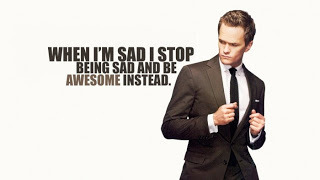
Who wouldn't buy an ebook off this guy?
9. What's the best way to promote my books?
This could inspire an entire blog topic all by itself. But I'll list the quick and dirty options here. Familiarize yourself with sites like Facebook, Twitter, and Goodreads if you haven't already. Offer your work up free of charge. Or, think up some fun giveaway contests related to the content of your book. If your book fits in with a particular holiday, for instance, maybe tie in a promotion with it. Also spend some time promoting work for your fellow authors, if you have the time. Do favors for them, and you may just get a favor in return. It's all about karma.
But perhaps the most important piece of advice I'd give to anybody who has a book to sell is this: don't spend too much time marketing your book. It makes you look like a self-absorbed writer. Not to mention a spammer. Instead, market YOURSELF. Make you the product. Show personality and realness, and be likable in some way. Make them want you to succeed. If you draw people to you, they may just buy your book. And if they buy your book and like it, they'll recommend it to other people. Your name is ultimately your brand, and you have to put yourself fully behind that brand by getting yourself out into the world and showing them that you're more than just a writer. They want to see the mind that's alive behind those pages. If you can't get people interested in the real you, then what makes you think they'll want to buy your book? People are connected through social media now more than ever, and they're not content with faceless names, let alone faceless names on book covers.
Some of the most famous authors in the world spend a lot of time on Twitter, and I can tell you this much: they hardly ever talk about their books.
10. Vampires are created that way? Seriously? What the hell were you smoking when you wrote that?
(Okay okay, cheap self-plug alert. However, I ran out of questions, and my absolute insistence on nice, neat whole numbers meant I couldn't end this list at 9 questions). Alcohol and nicotine were my best friends when I wrote Scarlet Letters: The Tale of the Vampire Mailman. If you have no idea what I'm talking about, well then you'll just have to download yourself a copy and find out exactly how vampires are created. It's available FREE on Smashwords until 7/31!
Published on July 19, 2011 07:42
July 14, 2011
An Experiment on Giving it All Away
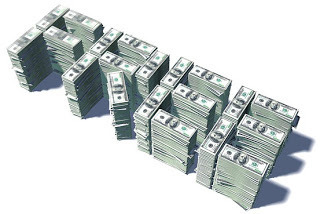 My life as an "indie" writer has been more or less without surprises. I knew when I uploaded a few short stories and a novel onto Amazon and Smashwords, I wasn't going to get rich. And I was right. I haven't. Not even close. Not even not even close.
My life as an "indie" writer has been more or less without surprises. I knew when I uploaded a few short stories and a novel onto Amazon and Smashwords, I wasn't going to get rich. And I was right. I haven't. Not even close. Not even not even close.I can name a number of reasons for this. Namely, I haven't been much of a salesperson. In this vast sea of Amanda Hocking hopefuls, it takes a lot to stand out, and although I've followed a lot of the recommended techniques, it hasn't been quite enough. But success in this field also takes a lot of luck. And while I've had a satisfactory number of downloads (satisfactory in that the downloads are roughly in proportion to the amount of effort I've put into promoting myself), I haven't exactly had what Malcolm Gladwell would call my "Tipping Point."
Still, I've been content with my performance. I have plans to add more to my online library over the next several months, and I'm feeling optimistic about the future. The question has now mainly become one about pricing. I've always felt my price points were directly in line with people's expectations of what they think is a fair price for downloadable content. $.99 for short stories, $2.99 for novels. Any more than that, and people will generally start to hesitate. It doesn't matter what I think my work is ACTUALLY worth (I think it's worth more than what I was already charging, but so what?). It's what people are willing to pay for it. Amazon knows this, and it's why they're tops in the business right now. They deeply discount their products to bring in more customers, and it works.
There's also the fact that people largely don't like to pay for downloadable content at all if they don't have to. The ones who do pay have to be a particular brand of passionate not only about reading, but about the future of e-books.
 You can throw Dean Wesley Smith algorithms in my face all you want, but the truth is that most people don't perceive digital things as tangible, and most people will only pay real money for tangible objects. You can throw up all the iTunes references you want. "But Allie, people pay for $.99 music all the time!" That may be so, but get back to me when books have become about as obsolete as music CDs. How many people do you actually know who still buy music CDs? Compared to people who buy books vs ebooks. Exactly.
You can throw Dean Wesley Smith algorithms in my face all you want, but the truth is that most people don't perceive digital things as tangible, and most people will only pay real money for tangible objects. You can throw up all the iTunes references you want. "But Allie, people pay for $.99 music all the time!" That may be so, but get back to me when books have become about as obsolete as music CDs. How many people do you actually know who still buy music CDs? Compared to people who buy books vs ebooks. Exactly.And that's without even getting into the fact that many people who download content are basically pirating it. Again, the lack of a price tag = more appealing for a generation of people who don't believe they should have to pay for digital content. This has never been more true to me than in the last week, when I started giving my work away as part of the Smashwords Summer Sale.
In doing so, I have discovered that there is a great demand for my work. In the first 24 hours of giving away my short stories, I'd made more sales than I had in three months. Did I care? Hell no. I loved it! And every day since then, I've been selling an average of twenty stories a day. Some days are more, some days less. Yesterday was close to fifty, and the numbers are on an upward trend. Stories that were once my lowest sellers are now my highest.
I didn't want to stop there. It was only my short stories that were free. My book, I had marked down to $1.49. But that still wasn't really selling as well (at least on Smashwords... my novel sales have generally been much higher through Amazon). So I decided today to make that one free as well. Within hours, the sales of that book have more than doubled.
This tells me a few things:
1. People are cheap bastards. Of course, I knew that already.
2. There is some kind of a demand for my work, or people wouldn't be downloading it the way they are.
 Do I care that the income I could've been making over the last week might have paid this month's electric bill if only people weren't such cheap bastards? No, not really. Whining about that is about as futile as saying I wouldn't have inhaled that bug if I hadn't been breathing. Breathing is mandatory for living, and people will always be cheap bastards. The key is working with or accepting the consequences for those things now and again.
Do I care that the income I could've been making over the last week might have paid this month's electric bill if only people weren't such cheap bastards? No, not really. Whining about that is about as futile as saying I wouldn't have inhaled that bug if I hadn't been breathing. Breathing is mandatory for living, and people will always be cheap bastards. The key is working with or accepting the consequences for those things now and again.Besides, I never went into self-publishing for the money. I'm doing it for the exposure. Giving away some of my work for free is a valuable marketing tool. In letting the work speak for itself, and letting people have free access to it, I could very well build a following that I might never have if I'd kept everything behind a pay wall. The name recognition and brand building is worth far more in the long run than the measly double-digit quarterly royalty payments I've been receiving.
In fact, I'm considering keeping the bulk of my catalog free. It feels a lot better seeing one free download after another, even if they're free, than a stubborn trickle of paid downloads. I know a lot of my writerly peers will call me crazy for that, but I'm thinking about the long game, and in my opinion, if the story isn't making you any money after several months, why bother charging? I'd rather the reader know my name. It isn't an instant gratification kind of thing, but I feel this has the potential to deliver a much huger dividend down the road.
Published on July 14, 2011 22:53
July 11, 2011
It's Time for a Creative Commoners Writing Challenge!

Every object has a story. Yes, even your hair dryer...
Have you ever looked at your favorite faded shirt or your beat-up cell phone or shiny car fresh from the car wash and wondered what it would say to you if given the chance? What about your kid's stuffed doll with that creepy button-eyed stare? We bet all these things have stories to tell, and we want you to be their voice.
We at Creative Commoners believe that personification of an otherwise inanimate object is a great way to stimulate creativity. You can strike any emotion, from humor to horror to heartfelt tragedy to scatological nonsense. Or all of the above. It's your object. It's your playground. Really give it your all. Do your blender (or recliner or favorite socket wrench) proud.
But there's another point to all this. The best entries will be featured on a future Creative Commoners episode, where you will live in audible infamy! Those goofballs at NPR's Three-Minute Fiction are nothing compared to us.
A couple key points:
We would like the piece to be in letter format. Imagine your chosen object is writing directly to you.
Entries should be in the body of an email or a Word document. Brevity is key. No more than a couple double-spaced pages. That's anywhere from 300-500 words.
Deadline for entries is August 8th. Email them to creativecommoners@gmail.com. We can't wait to read them!
Published on July 11, 2011 09:29
July 1, 2011
Swimming the Distance
 I've loved swimming my whole life, but I never did it for sport--never even really tried to--until the last month or so, when I finally decided it was time to start using that YMCA membership I've had for the last year. One thing or another kept getting in the way. Transportation was an issue at first, but my husband got his own car a few months ago, so I really had no excuse after that.
I've loved swimming my whole life, but I never did it for sport--never even really tried to--until the last month or so, when I finally decided it was time to start using that YMCA membership I've had for the last year. One thing or another kept getting in the way. Transportation was an issue at first, but my husband got his own car a few months ago, so I really had no excuse after that.All I knew was I desperately needed to get my body moving again. I'd become so sedentary this past winter, it was painful to even get out of bed in the morning. It's easy to slip into that when you do a job like mine, which requires no athleticism apart from limber fingers and the ability lift a coffee cup to one's mouth. And when you don't like exercise in general. Walking/biking/hiking/treadmill/elliptical wasn't going to do it this time. One day of that would do me in for the next week. And that kind of exercise feels like an utter chore to me.
There's one important mantra about exercise that I think everyone should keep in mind. Any consistent exercise you enjoy doing is far better for you than inconsistent exercise that you hate doing, even if the exercise you prefer is not exactly the most effective one. The key is to be consistent. And I knew that swimming was it for me. And you can't burn more calories with such low impact unless you move into orbit.
But when I first began, I had no concept of proper technique, and I only have an inkling of it now. I had no idea how to do that whole keeping my head in the water until it's time to come up for a breath thing, and coordinating kicking with the strokes is something I'm still working on. I had no goggles or swim cap to start out with. I also didn't have the proper bathing suit for swimming laps (I still don't, but that will be remedied in a few days). Basically, I got into the lane with my baggy swim dress on and paddled my ass from one end of it to the other until I couldn't do it anymore.
Then I started looking at the way some of the more polished people were swimming, and I wanted to be able to do what they did. And I wanted to move more efficiently through the water to reduce any strain on my shoulder joints. I got on the internet and YouTube and watched tutorials on how to do front crawls and backstrokes, and I bought a good pair of goggles and hit the pool again. This time, I was going to swim "properly."
But it wasn't easy. I inhaled or swallowed about a gallon of water as I taught myself how to time my breathing with my strokes, and how to keep from bringing half my body out of the water when I wanted to take a breath. It took about a week of consistent swimming before I found an actual rhythm at it. I'm far from perfect now. I'm still occasionally inhaling water, and my form could still use work, but I'm a far cry better than I was when I started this a few weeks ago.
In order to conserve my stamina, I alternate front crawls with backstrokes, which helps a lot, but I'm about to start spacing my backstrokes out more. Even after the first month of doing this, I've noticed a big increase in stamina.
As far as distance goes, I could only do five laps (ten lengths of a 25 yard pool) when I first started. I was surprised by how much of a workout even that was. A few days later, I was doing anywhere from eight to ten laps with minimal breaks in between. I celebrated it as a small milestone. Increasing my laps day by day, a little here and a little there, I'm holding steady at 18 laps, or a half mile. I'm well on track for the full mile within the next three weeks. I haven't been following any strict regimen of laps. I'm just listening to my body, pushing myself when I know I can, but remembering to enjoy myself.
I'd had no concept of how difficult this sort of thing was for some people. I though anyone could swim a mile. Then I later read that swimming a mile is in water the same benchmark as someone running their first 5K. I'm steadily training myself, and soon I'll be able to get to that mile and beyond.
I should note -- there are conflicting reports out there on the internet about what constitutes a lap and what doesn't. At first, I was counting lengths as laps. I've now learned I should be counting a lap as two lengths, so what I thought was a mile was actually a half. I've chosen not to let this discourage me, however. When I do make that true mile, the moment will feel even more momentous than it did the first time.
You could of course forget about counting laps entirely and just focus on your time spent swimming and maybe honing your technique. However, I'm a person who's pretty driven by milestones and deadlines, so counting laps works to keep me motivated. Like writing or any other pursuit, the key is to do it in a way that keeps you wanting to come back.
Published on July 01, 2011 14:44
June 27, 2011
My Humira Nightmare

One of my hands, before Humira
I can't remember the last time I looked at my hands and saw healthy, flesh-colored skin. I don't mean that as a turn of phrase. I really can't remember. I have a vague memory of sitting on the back porch at my old house in Washington and noticing one red psoriasis lesion forming on the middle finger of my left hand. I didn't think much of it at the time. While I'd always had permanently inflamed areas (like my elbows and scalp), the little spots always came and went. A year or so later, that one spot came to cover about 85% of both hands and arms. The disease often attacks in mirror images. Who knows why.
But I've lived with it for close to ten years. No one who knows me is new to the stories of my struggle with this shitty disease, so I'm not going to go into that here. I'll just reduce things down to a few little nuggets before getting to the point.
After repeated insurance denials over the last decade for the newer biologic medications to treat psoriasis, I was finally approved to start taking Humira back in April. This was not an easy process, and I entered it reluctantly. I'd heard of the side-effects. Some of them were downright deadly. But at that point, things were getting worse with it, and I felt like I needed to try something new.
It took several blood tests to check for things like Hepatitis and anemia, as well as a skin test for tuberculosis. They needed six vials of blood. I'm not an easy person to stick, so it took them three tries in three different veins to get all the blood they needed. I also had an allergic reaction to the tuberculosis test, which caused a red, itchy rash to form. Which meant I had to go for a chest x-ray to completely rule out exposure to TB. Also, because I'd apparently been previously exposed to Hep. B, I had to go back for yet another blood test to confirm that I didn't actually have an active infection
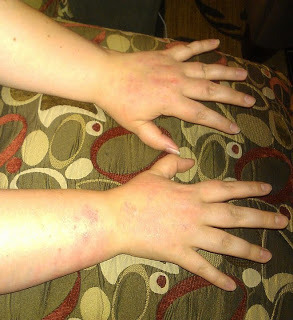
A month later, improving
So after all that hell, the doctors worked their magic with my insurance company, and a week later, I was contacted by the pharmacy to schedule my first delivery. All I had to do was pay them a $4 copay. That part seemed almost too easy. Of course, it was. But I didn't have to worry about that for the first month, as my starter pack arrived, and I took the first four doses as instructed. I started to notice some results after the first two weeks, and by the end of the first month, things were looking better. While there hadn't been any real clearing of the redness, the psoriasis had stopped proliferating. It no longer hurt or scaled up at all.
Like clockwork, the pharmacy contacted me at the end of May, I thought to schedule the next delivery. Only they told me that due to changes in my insurance, I had to go through this other pharmacy. Since they've been such incredibly incompetent assholes from beginning to end, I thought I'd go ahead and give you the name of this new pharmacy: Curascript.
A quick aside to anyone who ever has to deal with a home delivery pharmacy, if you are ever put with these people by your insurance, RUN. They are the purest definition and demonstration of incompetence you will find anywhere. I'll discuss more on that in a bit.
So I called Curascript immediately to set up my new account with them. They hadn't received my information yet from Diplomat (aka, The Better Pharmacy), but they at least got my name and insurance info into the system so that (theoretically), I'd be all set to go when my information from Diplomat arrived. I was told they would call me as soon as they got that info. Well, it didn't quite work that way. I did receive a phone call, but it was only to tell me that they hadn't received the information yet, and that they were contacting my doctor to get a new prescription, and that once they had it, they'd call me again. Um, okay...
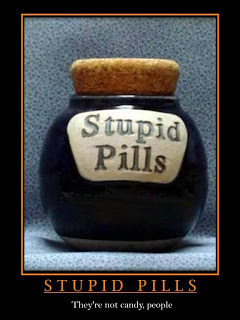 A week passed, and I realized I was due for my next shot in another week. So much for them calling me, right? So I called them back. They still hadn't done anything with my case yet, but rest assured, they'd DEFINITELY call me by Thursday of that week. Right? Wrong. It was Friday afternoon when I called them back.
A week passed, and I realized I was due for my next shot in another week. So much for them calling me, right? So I called them back. They still hadn't done anything with my case yet, but rest assured, they'd DEFINITELY call me by Thursday of that week. Right? Wrong. It was Friday afternoon when I called them back. This was when I learned that the reason no one had moved on my claim was because my insurance had maxed out. Of course, none of them had bothered to call and tell me this before. It was almost as if they took a look at my case file and decided, since it was was more work than they felt like doing, they'd assumed someone else would handle it. Fail.
When I called Anthem to confirm that my prescription benefits had indeed maxed out and that they were only going to pay 50% of the costs, I called Curascript back then to tell them that I couldn't afford this medication out of pocket, which would cost me $900 a month. More than my rent payment, in other words.
They told me to call the Patient Assistance Program at Abbott, the maker of the drug, as they can usually provide a little bit of money toward the costs. Isn't that nice? They dole out thousands of dollars a year per patient for people who can't afford it, yet they still charge $900 a shot for the shit. In a matter of minutes with the Abbott folks, I was approved. I was told they would apply $1200 toward the first month's supply of the drug and (so they told me) $750 toward the subsequent months. While I wasn't sure this was going to be enough, I went ahead and signed up for it, figuring it will at least get me through this next month.
I was instructed to call Curascript and give them the information for the payment plan. It should be noted that it took Curascript another THREE days to get it into their system, because the first guy didn't enter it right, and the next person who apparently fixed it never called me back to tell me it was fixed. What should have taken 24 hours took 72. I was now a day and a half away from my next scheduled dose.
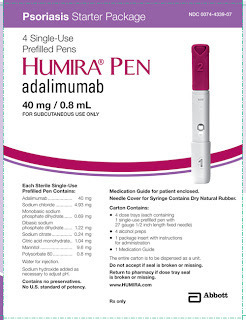
Get your first month for only $3600!
So I finally received two more shots the next day. $1800 dollars worth of medicine. Holy shit. Well, at least I could finally relax for a couple weeks. But there is no better demonstration of how fast two weeks really can pass when it comes to something you've been dreading. When Curascript called to reschedule the next delivery, I held my breath and went through the whole rigmarole, expecting it to be a nightmare. But when the girl said I'd only have to do a $5 copay, and that I was all set for a Tuesday delivery, I was floored. Was there some of the $1200 from Abbott left to cover toward the next month? Are you people sure you didn't fuck something up?
Perhaps it was stupid of me to assume that these people knew what they were doing.
This was Thursday of last week. As of today, I was set for a Tuesday delivery (tomorrow). Then I got a phone call an hour ago telling me I was actually on the hook for $500.
The girl asked, "Would you like to take care of that with your credit card on file?"
"Um, NO," I say. "Why the hell wasn't I made aware of this when I talked to you people last week?"
"Well, we only ran your insurance yesterday, and after your insurance and the assistance program, there was still the $500 left to pay."
"You know what? No. I can't afford this medication. I can't handle this bullshit anymore." I could feel a lump rising in my throat. I'd finally had enough. Even though I would've had to pay that money regardless, it was shitty to let a person pay $5, thinking that's all they owed, only to be told the DAY before their next delivery that no, you actually owe 100 times that much. Could the woman who originally called me not see my information on the screen in front of her? Why hadn't they run the insurance sooner?
The answer is simple, really: Curascript is run by dumbshits.
The girl then put me on hold to see if they had any other assistance programs, "so you won't have to go without your medication." And all I wanted was to scream, "Isn't that nice how this system works? Get approved for an astronomically expensive medication on shitty insurance, which you're charging full cost for no doubt, only to be told that I can't get it unless I can cough up another $500 or more a month for it. And then you act like you give a shit that I might have to go without it?!"
Instead, I said, "Look, it's not a life-saving medication. And thank god for that, huh? If this was a chemo drug or insulin, I'd probably be having an aneurysm over the phone right now. So no, I'm done."
She gave me the numbers for a few non-profit organizations made for people just like me: under-insured broke people who need expensive medication but can't afford it.
I checked these places out. They seemed decent enough, but they couldn't help me. They either did not allocate funds for my particular disease, or they had already allocated the funds they do have for it. Either way, I've likely exhausted all avenues for help with Humira, which means I'm no longer going to be able to take it. I could afford maybe a $100 monthly copay. But not $500.
I can now sit here with the knowledge that if I truly ever got sick, the insurance I have would be completely useless to me. I can now understand, in a roundabout way, how thousands of insured and uninsured people DIE every year in this country as a result of our shitty health care system. I don't weep for myself and my annoying and uncomfortable, but undoubtedly non-lethal condition. I weep for those who those who have been forced to make the choice between dying and paying for medications they can't afford.
As such, I'm going to enjoy the little bit of remission I've had with this disease for the first time in ten years. Sure, the redness is still there, but my skin has been so smooth and soft, I have hardly noticed it. I don't know if it'll bounce back right away upon stopping the medication or if it will come back worse than ever. I was only on it for a couple months, so hopefully it won't be too bad. But it's hard to know. I feel lucky that my condition, as it was, was at least somewhat manageable. There are people who are much worse-off than I am, and I am so very sad and angry for them right now.
 As for me, I'm finding the silver linings. The potential side-effects for this drug are downright scary. And I don't want to go into the fall and winter months with a suppressed immune system anyway. People have experienced some horrible things taking this drug. They've also experienced a recurrence of their respective diseases even while still on it, which means I might not have been "cured" for long anyway.
As for me, I'm finding the silver linings. The potential side-effects for this drug are downright scary. And I don't want to go into the fall and winter months with a suppressed immune system anyway. People have experienced some horrible things taking this drug. They've also experienced a recurrence of their respective diseases even while still on it, which means I might not have been "cured" for long anyway. I can also continue to try and beat it down with other avenues of treatment. I've been researching holistic and nutritional remedies for this disease and plan to hit the health food store for zinc, B vitamins, Omega-3s, and organic vegetables for juicing. I'm going to keep swimming. I'm going to nourish my body so that it can heal itself, which is perhaps what I should've been doing all along.
No one ever got tuberculosis, multiple sclerosis, and lethal fungal infections from drinking vegetable juice and taking vitamin and Omega-3 supplements. But many HAVE experienced complete clearing of their psoriasis from doing so.
So in the end, I'd like to thank Humira, Curascript, and Abbott Pharmaceuticals for this hassle. The good thing about this particular nightmare is that I can wake up from it. My life will be so much easier without this over-priced poison.
Published on June 27, 2011 14:38
June 23, 2011
New Happenings: A Podcast with Yours Truly
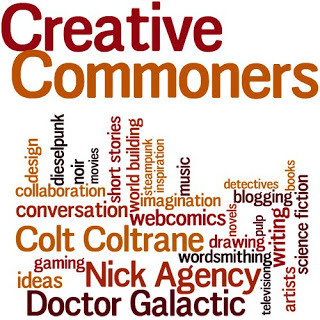 A couple months ago, an interesting meeting of the minds took place between me and my friends Chris Armstrong and Corey Bishop. The subject: a Podcast about the creative process, where we could talk about our various projects and provide something of a support group for ourselves and other people who could relate to balancing creative pursuits with domestic responsibilities.
A couple months ago, an interesting meeting of the minds took place between me and my friends Chris Armstrong and Corey Bishop. The subject: a Podcast about the creative process, where we could talk about our various projects and provide something of a support group for ourselves and other people who could relate to balancing creative pursuits with domestic responsibilities.The three of us have known each other for many years, though Chris and Corey have known each other much longer. I didn't come along until high school, when I met Chris in freshman year German class. And though we were always friendly acquaintances, it wasn't until around senior year and thereafter that we really bonded. I didn't meet Corey until around then. But we always clicked as a group, with similar interests and great banter. And we eventually logged enough gaming hours together to make a formidable team. And that team, nearly a decade and half and a good span of adulthood later, has become Creative Commoners.
The one thing I love most about our group is that we come from different enough backgrounds to offer a varying enough perspective to all sorts of people. Chris is a pop culture hound who runs a web comic, Detective Agency, and has always had an uncanny ability for making up new words. He also has a brain that absorbs movie dialog like a sponge, as you'll probably notice from time to time. Corey is a programmer by trade and is just starting to get into game development as well as short story writing. He also has a short story coming out in a pulp mag pretty soon (more details on that as it's released), and has gleaned a lot of his inspiration from his tabletop gaming hobby. As for me, I'll be bringing a lot of my experience from writing stories and novels to the table, as well as my adventures in trying to get published in the traditional market while also trying to build a sustainable business with self-published work and freelance editing.
Over the first few episodes, we have discussed our creative origins, key inspirations, and some details of our recent worldly travels (like my trip to the Pikes Peak Writers Conference, as well as Corey's trip to the Google I/O Conference and Chris's trip to Ireland). At some point, we hope to branch the show out a bit more to include listener questions and special guests, because we realize there are creative commoners out there just like us who could use the sort of support and stimulation that comes from mingling with other people who are on similar creative journeys. And we like to think we're pretty damn funny/entertaining, and that listening to us is like listening in on a light and casual group discussion.
At any rate, we hope you'll become a fan of Creative Commoners at both our website, Facebook, and Twitter, as well as subscribe to our feed on iTunes! Episodes will be airing every Thursday, so update your iTunes subscription feeds and your RSS feeds! We've so far taped five shows, and the first one is now available to listen to on our website as well as in the iTunes store. Just search podcasts for Creative Commoners!
Published on June 23, 2011 19:26
June 15, 2011
In Water...
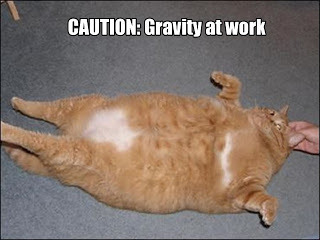 My body is used to being judged. By eyes, but especially by gravity. I often feel like this gargantuan mass roaming about society like a moving flesh island, my lumbering movements akin to continental drift. Walking and running and hiking remind me on a regular basis that though my muscles and bones are pretty well adapted from a long life of lugging around this wide load, I'm limited by my size. Or at least I feel limited.
My body is used to being judged. By eyes, but especially by gravity. I often feel like this gargantuan mass roaming about society like a moving flesh island, my lumbering movements akin to continental drift. Walking and running and hiking remind me on a regular basis that though my muscles and bones are pretty well adapted from a long life of lugging around this wide load, I'm limited by my size. Or at least I feel limited.I'm not as daring as I once was. I used to scamper and bounce more. I think part of what limits me now is fear of injury. I broke my leg falling down some stairs ten years ago, and my scampering days came swiftly to a halt. I can still feel that bone snapping. I never want to feel it again. But I'm reminded of it every time I go for a long walk or try to jog, and that plate in my tibia begins to sing. And I'm reminded that as easily as I can still move around for someone of my size, it's just not as easy as it used to be. And when I'm lagging several steps behind my husband as we go for a walk, because my natural pace is half again as slow as his, I can feel gravity telling me, yet again, that I'm no match for it. That if I don't get stronger, it will win.
Of course, as that Radiohead song says, gravity always wins. But I'm not giving into it yet.
 The water doesn't judge. In it, I feel free. Reborn. It doesn't tell me I'm too fat to move swiftly and with grace, because I can do both. In water, I feel rejuvenated. Released from the inexorable pull this world has on me, I can float as if on a cloud, or propel myself like a fish. I can do flips and handstands. With my children, I can be the human jungle gym that their father always is on the floor.
The water doesn't judge. In it, I feel free. Reborn. It doesn't tell me I'm too fat to move swiftly and with grace, because I can do both. In water, I feel rejuvenated. Released from the inexorable pull this world has on me, I can float as if on a cloud, or propel myself like a fish. I can do flips and handstands. With my children, I can be the human jungle gym that their father always is on the floor.If I tried to run even a quarter of the distance I can swim, I'd crumble into a gasping, wheezing, sweating puddle of lipids and misery, and I'd never want to move again. But I can swim nearly a mile (and hopefully, at some point, beyond that) and go about the rest of my day feeling happier, firmer, and fully aware of my body's miracle. I'm a thinking, breathing, moving, capable, powerful, worthy, fully actualized person. I feel the way I deserve to feel. That's what good exercise can do. And the water is my medium.
Every time I enter the welcoming embrace of the water, my whole body sighs. And it believes.
Published on June 15, 2011 08:08



